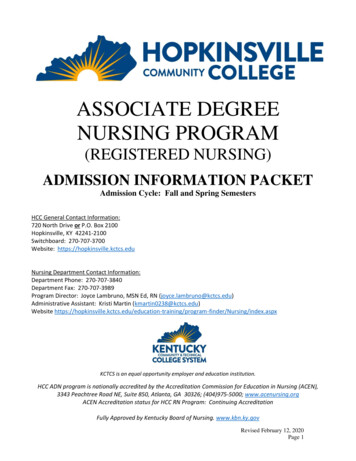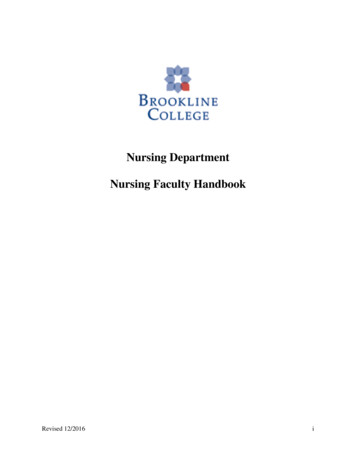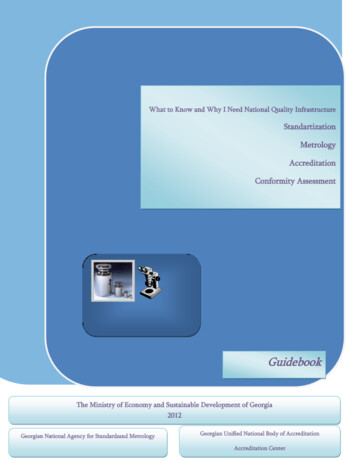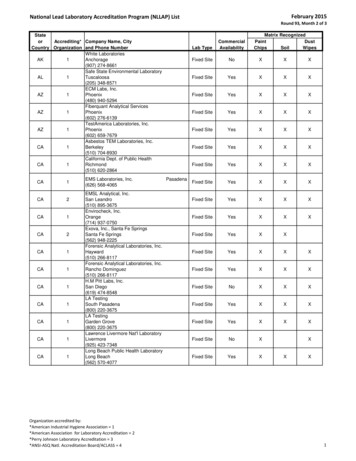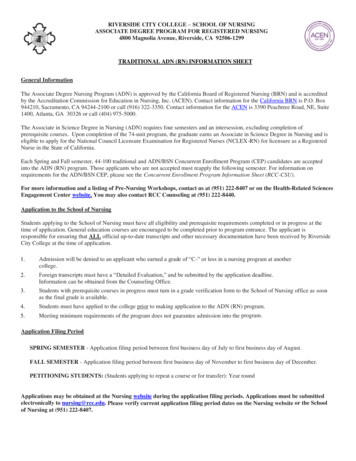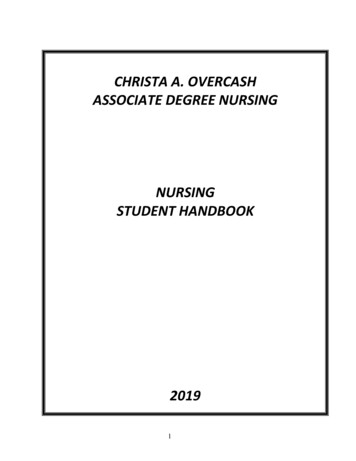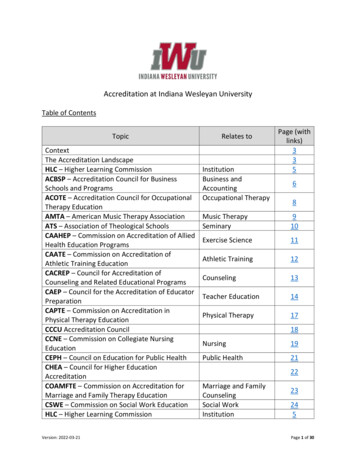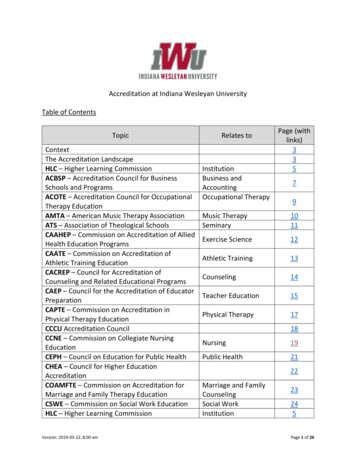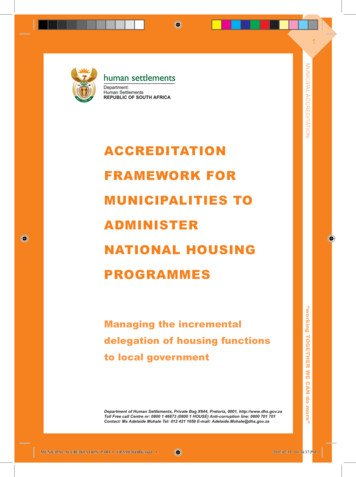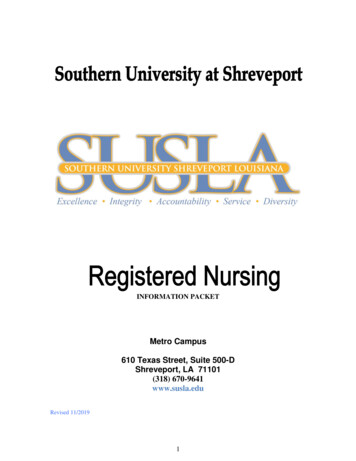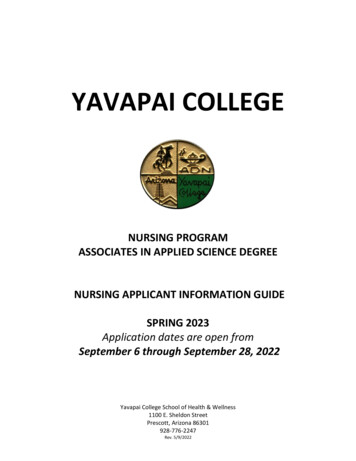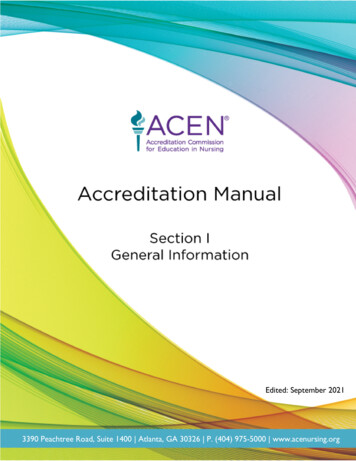
Transcription
Edited: September 2021Copyright 2020 Accreditation Commission for Education in Nursing.All Rights Reserved3390 Peachtree Road, Suite 1400 Atlanta, GA 30326 P. (404) 975-5000 www.acenursing.org
ACEN 2017 Accreditation ManualThird Edition Issued July 2020Last Edit: September 2021GENERAL INFORMATIONA publication of:Accreditation Commission for Education in Nursing3390 Peachtree Road NESuite 1400Atlanta, GA 30326USAPhone: 1 (404) 975-5000Web: www.acenursing.orgCopyright 2020 Accreditation Commission for Education in Nursing.All Rights Reserved
ACENTM 2017 Accreditation Manual Second Edition GENERAL INFORMATIONTABLE OF CONTENTSSECTION 1 - GENERAL INFORMATIONINTRODUCTION . 2MISSION . 2PURPOSE . 2GOALS . 3RECOGNITION . 3BENEFITS OF ACCREDITATION . 3PHILOSOPHY OF ACCREDITATION. 4ACEN AND THE HISTORY OF NURSING ACCREDITATION . 4PRODUCTS AND SERVICES . 4ACEN ORGANIZATIONAL STRUCTURE . 5THE COMMISSION. 5OVERALL STRUCTURE OF THE COMMISSION . 5BOARD OF COMMISSIONERS . 5ACEN STAFF . 6ACCREDITATION STANDARDS AND CRITERIA FOR ACADEMIC QUALITY OFPOSTSECONDARY AND HIGHER DEGREE PROGRAMS IN NURSING . 7ACEN DEFINITION OF QUALITY . 7UNDERSTANDING ACEN STANDARDS AND CRITERIA IN THE EVALUATION OF NURSINGEDUCATION UNITS . 8ACCREDITATION PROCESSES AND PROCEDURES . 8ACCREDITATION CYCLES . 8PLANNING FOR ACCREDITATION . 8OVERVIEW OF THE INITIAL OR CONTINUING ACCREDITATION PROCESS . 9CANDIDACY PROCESS .10INITIAL ACCREDITATION.12CONTINUING ACCREDITATION .12ASSISTANCE .13SELF-REVIEW AND SELF-STUDY REPORT .13THE INITIAL OR CONTINUING ACCREDITATION SITE VISIT .14Multiple Nursing Programs Within a Nursing Education Unit . 14Coordinated Site Visits With Other Agencies . 15Length of the Initial or Continuing Accreditation Site Visit. 15Assignment of Peer Evaluators on a Site Visit Team . 15Team Chairperson . 16Responsibilities of the Team Members . 16Travel Arrangements . 17Agenda for the Initial of Continuing Accreditation Site Visit . 18Visiting Off-Site Locations of the Nursing Program . 18Access to Hybrid/Online Nursing Courses. 18Internet Access While on Campus and at the Hotel . 18THE SITE VISIT REPORT .19ACEN Staff Review . 19EVALUATION REVIEW PANEL .19Nursing Program Representative Attendance at the Evaluation Review Panel Meeting . 20BOARD OF COMMISSIONERS .20PEER EVALUATORS .20Eligibility for Selection as a Peer Evaluator. 20Selection, Appointment, and Maintaining Eligibility as a Peer Evaluator . 22Evaluation Review Panel Members . 22Appeal Committee Members . 23Arbitrators. 231
ACENTM 2017 Accreditation Manual Second Edition GENERAL INFORMATIONINTRODUCTIONMISSIONThe Accreditation Commission for Education in Nursing (ACEN) supports the interests ofnursing education, nursing practice, and the public by the functions of accreditation. Accreditationis a voluntary, peer-review, self-regulatory process by which non-governmental associationsrecognize educational institutions or programs that have been found to meet or exceedstandards and criteria for educational quality. Accreditation also assists in the furtherimprovement of the institutions or programs as related to resources invested, processesfollowed, and results achieved. The monitoring of certificate, diploma, and degree offerings is tiedclosely to state examination and licensing rules and to the oversight of preparation for work inthe profession.PURPOSEThe purpose of the ACEN is to provide specialized accreditation for all levels of nursingeducation and transition-to-practice programs.Nursing Education Accreditation:The ACEN is recognized by the United States Department of Education (USDE) as aspecialized accrediting agency for nursing education programs located in the UnitedStates and its territories.The ACEN is recognized by the Council for Higher Education Accreditation (CHEA) fornursing education programs in the United States and its territories as well as forinternational nursing education programs.The ACEN accredits all types of nursing programs, including clinical doctorate/DNPspecialist certificate, master’s/post-master’s certificate, baccalaureate, associate, diploma,and practical nursing programs.The ACEN accredits nursing programs in secondary, postsecondary, and hospital-basedgoverning organizations that offer certificates, diplomas, or degrees.The ACEN serves as a Title IV-HEA Gatekeeper for some practical nursing programs andhospital-based programs eligible to participate in financial aid programs administered bythe United States Department of Education or other federal agencies.Transition-to-Practice Accreditation:The ACEN accredits non-credit transition-to-practice programs at all levels of nursinglicensure.The ACEN accredits non-credit transition-to-practice programs offered by academicinstitutions (e.g., university, college, career center) and/or healthcare agencies (e.g.,hospitals, long-term care).2
ACENTM 2017 Accreditation Manual Second Edition GENERAL INFORMATIONGOALSAs the leading authority in nursing accreditation, the goal of the ACEN is to be a supportivepartner in strengthening the quality of nursing education and transition-to-practice programsthrough: Supporting nursing education and transition-to-practice programs in obtaining andmaintaining accreditationPromoting peer reviewAdvocating for self-regulationFostering quality, equity, access, opportunity, mobility, and preparation for practice, ortransition-to-practice, at all levels of nursing preparationDeveloping standards and criteria for accreditationRECOGNITIONThe ACEN is recognized as the accrediting body for all types of nursing education by: United States Department of Education (USDE)Council for Higher Education Accreditation (CHEA)National, regional, and specialized accreditors that oversee federal funding eligibility must bereviewed by the USDE to ensure that the accrediting body meets specific standards establishedby Congress. The Secretary of Education for the USDE is charged with review of accreditingbodies and providing recognition to those accrediting agencies that meet the Secretary ofEducation’s criteria. Students in institutions or programs accredited by a USDE-recognizedagency may be eligible for federal financial aid assistance and other needed resources.CHEA is a national and international advocate for academic quality through accreditation. TheACEN is recognized by CHEA as a programmatic accreditor for all levels of nursing education inthe United States and its territories, as well as internationally, and inclusive of those programsdelivered vis distance education.BENEFITS OF ACCREDITATIONACEN accreditation is a voluntary peer-review process intended to enhance quality improvementin nursing education. Accreditation: Student benefits:o Provides useful information for students’ career and education decision-makingo Enables student eligibility for funding support from federal and state agencies, andfoundationso Facilitates transfer of creditso Is required for admission to many undergraduate and graduate nursing programs,as well as by some state regulatory agencies or employersFaculty benefits:o Heightens faculty members’ and administrators’ awareness and responsiveness toareas needing developmento Offers professional development opportunity and validationCommunity benefits:o Assists employers seeking graduates who are competent practitioners3
ACENTM 2017 Accreditation Manual Second Edition GENERAL INFORMATIONPHILOSOPHY OF ACCREDITATIONThe ACEN accreditation program is founded on the belief that specialized accreditationcontributes to the centrality of nursing for the public good and provides for the maintenance andenhancement of educational quality through continuous self-assessment, planning, andimprovement. Accreditation indicates to the general public and to the educational communitythat a nursing program has clear and appropriate educational objectives and is working to achievethese objectives. Emphasis is placed upon the total nursing program and its compliance withestablished standards and criteria in the context of its mission/philosophy as well as current andfuture nursing practice.Accrediting agencies share responsibility with faculty and clinicians for the development ofaccreditation standards and criteria, policies, and procedures for participation in accreditationand review of accreditation processes. The ACEN supports the continuation and strengthening ofvoluntary specialized accreditation by peers as a principal means of public accountability andongoing improvement. Specialized accreditation sets standards for programs and ensures,through the self-study process and accreditation review process, the promotion of effectiveeducation and program improvement. Because the nursing education unit analysis is closelyrelated to the governing organization itself, ACEN activities will, when possible, be coordinatedwith those of other officially recognized regional and specialized accrediting bodies as well asstate agencies.Standards and criteria for accreditation, materials that document compliance, policies, andprocedures are based on principles widely accepted and tested in general and professionaleducation. All those involved in the process must be aware of current developments in educationand nursing; the effectiveness of the current standards, criteria, policies, and procedures; and theevidence of need for change. A systematic ongoing review of all components of the accreditationprocess is essential to ensure an up-to-date, reliable, and valid accrediting process.ACEN AND THE HISTORY OF NURSING ACCREDITATIONThe ACEN has a long standing history with nursing accreditation in the United States. It was thefirst nursing accrediting agency. Please see the ACEN website for additional information aboutthe history of the ACEN.PRODUCTS AND SERVICES Initial and continuing accreditation site visits, including domestic and international, ofapproximately 150–200 nursing programs per yearContinuous monitoring of more than 1,200 nursing education programs per yearACEN Directory of Accredited Nursing Programs (electronic database)Continuing education and professional Candidacy Mentoring ProgramAdvisory Review ProgramObserver Program4
ACENTM 2017 Accreditation Manual Second Edition GENERAL INFORMATIONMentoring by Professional StaffACEN Accreditation ManualoGeneral InformationoPoliciesoACEN Standards and Criteria/GlossaryBridges and Signal Flame (electronic newsletters)Report to ConstituentsoAnalysis of ACEN Annual ReportsoAnalysis of Accreditation CyclesACEN website: www.acenursing.orgACEN ORGANIZATIONAL STRUCTURETHE COMMISSIONOVERALL STRUCTURE OF THE COMMISSIONThe ACEN is governed by a 17-member Board of Commissioners. The Commissioners areelected by the representatives of ACEN-accredited nursing programs. The legal basis for thefoundation and structure of the Commission is outlined in the Bylaws and the Articles ofIncorporation. The ACEN is incorporated under the laws of the state of New York.BOARD OF COMMISSIONERS5
ACENTM 2017 Accreditation Manual Second Edition GENERAL INFORMATIONEleven Commissioners are nurse educators representing ACEN-accredited programs,three Commissioners represent the public, and three Commissioners represent nursingservice.Commissioners are diversified and ensure balanced representation from across identifiedconstituencies insofar as possible.The Board of Commissioners sets accreditation policy and makes accreditation,administrative, budget, and policy decisions.Commissioners serve as chairpersons of the program-specific Evaluation Review Panels.Decision of accreditation status is made by the Commissioners based on review ofprogram materials including but not limited to the Self-Study Report/Focused VisitReport/Follow-Up Report, the Site Visit Report/Focused Site Visit Report/Follow-UpVisit Report from peer reviewers, and the recommendation of the Evaluation ReviewPanel.No current governor, current officer, or current or former employee of the NLN or itssubsidiaries, or current employee of the ACEN, may serve as a Commissioner.Names, credentials, and affiliations of Commissioners are available online.ACEN STAFFThe ACEN staff maintain operational functions of the office and support the Chief ExecutiveOfficer (CEO), Board of Commissioners, and nursing programs. Names and credentials of staff areavailable online.6
ACENTM 2017 Accreditation Manual Second Edition GENERAL INFORMATIONACCREDITATION STANDARDS AND CRITERIA FORACADEMIC QUALITY OF POSTSECONDARY ANDHIGHER DEGREE PROGRAMS IN NURSINGACEN DEFINITION OF QUALITYThe core values of accreditation emphasize learning, community, responsibility, integrity, value,quality, and continuous improvement through reflection and analysis.Peer review is a long-established and effective process that promotes institutions and academicprograms embracing quality assurance and quality improvement to become stronger and betterinstitutions and programs by setting standards of educational quality. It is used by the ACEN tohelp determine which programs meet or exceed established standards and criteria foreducational quality in nursing education. The ACEN peer evaluators are familiar withcontemporary practices in various program types and receive training from the ACEN to makeinformed recommendations about a program’s compliance with the ACEN Standards andCriteria.7
ACENTM 2017 Accreditation Manual Second Edition GENERAL INFORMATIONQuality in nursing education ensures high levels of opportunity for student learning andachievement. Accreditation is an affirmation of values central to postsecondary and highereducation including appropriate mission, organizational structures, processes, and functions;resources aligned with core values; collegiality; and continuous improvement.The ACEN accredits all types of nursing education programs leading to a diploma, certificate, ordegree in a variety of postsecondary and higher education settings, including vocational-technicalschools, hospitals, professional schools, community/technical colleges, and colleges/universities.UNDERSTANDING ACEN STANDARDS AND CRITERIAIN THE EVALUATION OF NURSING EDUCATION UNITSEach certificate, diploma, or degree has an identifiable, discrete set of specific end-of-programstudent learning outcomes and program outcomes. Postsecondary and higher education providefor the development of learners’ ability to think for themselves, master analytical problemsolving, apply scientific knowledge, and make value judgments within the context of the specificprogram type. Thus, education requires a broad academic orientation and depth and breadth ofintellectual skills translated into competencies so as to fulfill nursing’s functions in all types ofnursing.Standard – Agreed-upon expectations to measure quantity, extent, value, and educationalquality.Criteria – Statements that identify the elements that need to be examined in evaluation of aStandard.The current version of the ACEN Standards and Criteria become effective on the date specifiedby the Board of Commissioners. Programs scheduled for review within 12 months of the ACENStandards and Criteria effective date may elect to use the current or former version of theACEN Standards and Criteria.ACCREDITATION PROCESSES AND PROCEDURESACCREDITATION CYCLESThe ACEN has two accreditation cycles annually the Fall Cycle: July 1 to December 31 while theSpring Cycle: January 1 to June 30. During each of the cycles there is a six to seven-week periodduring which the initial and continuing accreditation site visits are scheduled.PLANNING FOR ACCREDITATIONNursing programs considering accreditation should contact the ACEN to begin the Candidacyprocess. As part of this process, nursing programs will be assigned a member of the professionalstaff as their mentor. The mentoring service is provided to facilitate faculty self-review andplanning. The nurse administrator, the program faculty, and administrative officers of thegoverning organization determine when the program is ready to apply for candidacy and theinitial accreditation site visit. The decision should be based on an in-depth self-study of theprogram in relation to the ACEN Standards and Criteria.8
ACENTM 2017 Accreditation Manual Second Edition GENERAL INFORMATIONNote: Upon granting of initial accreditation by the ACEN Board of Commissioners, the effectivedate of initial accreditation is the date on which the nursing program was approved by the ACENas a Candidate program that concluded in the Board of Commissioners granting initialaccreditation. Accreditation is not retroactive for students who graduated prior to theprogram achieving a Candidate status with the ACEN. See ACEN Policy #34.OVERVIEW OF THE INITIAL OR CONTINUING ACCREDITATIONPROCESSThe ACEN accreditation process includes the following primary steps:*An Appeal Committee may be convened only when initial or continuing accreditation is denied by the Board of CommissionersPrograms seeking initial accreditation with the ACEN must start with the Candidacy process. TheACEN process for nursing programs seeking initial accreditation after achieving Candidate statusor continuing accreditation is a comprehensive four-step process starting with the program’s selfreflection regarding its compliance with the ACEN Standards and Criteria and as presented in itsSelf-Study Report. The second step is the site visit of the program resulting in the peer evaluatorsdocumenting their assessment and accreditation recommendation regarding the program’scompliance with the ACEN Standards and Criteria in the Site Visit Report. In the third step, aprogram-specific Evaluation Review Panel examines the reports written by and about theprogram (Self-Study Report and Site Visit Report) reaching their own independent judgement andaccreditation recommendation regarding the program’s compliance with the ACEN Standardsand Criteria. The final step is a review of the process by the ACEN Board of Commissioners.While considering the peer evaluators’ judgement and accreditation recommendations, the9
ACENTM 2017 Accreditation Manual Second Edition GENERAL INFORMATIONCommissioners also reach their own independent judgement regarding the program’s compliancewith the ACEN Standards and Criteria and make an accreditation decision.CANDIDACY PROCESSA nursing program seeking initial accreditation must apply for Candidacy. A nursing programoffered by a single governing organization or a nursing program offered by multiple governingorganizations that have formed a consortium may be eligible for ACEN accreditation. If aconsortium seeks accreditation, all governing organizations within the consortium must offer thesame program type leading to an authorized degree or certificate/diploma.1. All governing organizations within the consortium must meet approval and accreditationrequirements as stated by the ACEN; see Policy #3 Eligibility for Initial and ContinuingAccreditation.2. The consortial nursing program must meet approval requirements as stated by theACEN; see Policy #3 Eligibility for Initial and Continuing Accreditation.3. The consortial nursing program must meet the ACEN definition for being a single nursingprogram; see ACEN Glossary.Candidate status is granted after the ACEN professional staff review the nursing program’spotential to achieve ACEN accreditation through a review of the Candidacy Presentation.Programs applying for initial accreditation will be assigned an ACEN professional staff memberonce they have begun the Candidacy process. A program seeking accreditation must:1. Complete Candidacy Eligibility Application. After eligibility has been confirmed, submitpayment for the required fee. See Schedule of Accreditation Fees for DomesticPrograms. See Schedule of Accreditation Fees for International Programs.2. After eligibility has been confirmed and within the designated timeframe, submit aCandidacy Presentation based upon the guidelines.NOTE: The Candidacy process differs for international nursing programs. Information regardingthis process is available in the Supplement of International Programs.All materials submitted are reviewed by the ACEN professional staff. Applicants are notified ifthey are approved for Candidacy, are deferred, or are disapproved. Approval for Candidacy isgranted when the nursing program (a) demonstrates it is currently compliant with therequirements of the Candidacy Presentation and Candidacy process or (b) demonstrates anability to be compliant with the requirements during the Candidacy period. A program may alsobe differed or disapproved. See Policy #34 Candidacy for Governing Organization/Nursing ProgramSeeking Initial Accreditation.10
ACENTM 2017 Accreditation Manual Second Edition GENERAL INFORMATIONAn overview of the Candidacy process:Programs that achieve Candidate status must publically disclose its Candidate status. See Policy#34 Candidacy for Governing Organization/Nursing Program Seeking Initial Accreditation.If a program’s Candidacy expires prior to scheduling an initial accreditation site visit, then theprogram must restart the candidacy process to renew its candidate status. The Candidacyprocess can be restarted at any time after either being disapproved or when the program’sCandidacy has expired.Each governing organization/nursing program making a Candidacy Presentation to ACEN orgranted Candidacy agrees to certain requirements concerning financial obligation, choice of law,jurisdiction, and venue. See Policy #28 Litigation and Policy #38 Binding Arbitration.Programs pursuing Candidacy and initial accreditation with the ACEN must notify the ACEN ofchanges that occur in the program during the entire Candidacy process as both eligibility forCandidacy and Candidate status are based upon the information provided in the CandidacyEligibility Application or the Candidacy Presentation. Changes that occur can affect theprogram’s eligibility to pursue the process and/or achieve initial accreditation with the ACEN.Therefore, programs must notify the ACEN of changes, which include but are not limited to,11
ACENTM 2017 Accreditation Manual Second Edition GENERAL INFORMATIONchanges in nurse administrator, change in status with the state regulatory agency or theaccrediting body of the governing organization, changes in curriculum/options, potential additionof a new location, or implementation of distance education. Contact your ACEN mentor forguidance related to any change and the potential need to report a change. The ACEN must benotified of all changes no less than four months prior to the change or as soon as possible for anyunexpected changes. The notification should be in writing and should address the selectedCriteria from the Candidacy Presentation related to the change (e.g. all of the Standard 4Curriculum Criteria for a change in the curriculum and/or new option). Failure to notify theACEN of changes may delay or jeopardize a nursing program from being approved for Candidacy;hosting an initial accreditation site visit; or being granted initial accreditation by the Board ofCommissioners. See ACEN Policy #34 Candidacy for Governing Organization/Nursing ProgramSeeking Initial Accreditation.INITIAL ACCREDITATIONA governing organization that offers a program not accredited by the ACEN initiates theCandidacy process through its chief executive officer and nurse administrator. The chiefexecutive officer of the governing organization for the nursing program/nursing education unit aswell as the nurse administrator must authorize the ACEN to conduct the accreditation processby submitting the Official Authorization for Candidacy Process Form. Once Candidacy status has beenachieved, the chief executive officer of the governing organization and the nurse administratormust authorize the scheduling/hosting of the initial accreditation site visit using the InformationForm for Accreditation Site Visit. A program seeking initial accreditation must achieve Candidacyprior to scheduling the initial accreditation site visit. (See section on Candidacy Process above)A nursing program may discontinue the initial accreditation process at any time. A programseeking initial accreditation can also withdraw from the process at any point prior to beingreviewed by the Board of Commissioners.NOTE:In order for the ACEN to properly discharge its responsibilities to the U.S. Department ofEducation pursuant to 34 CFR Section 602.28 and per Policy #3 Eligibility for Initial or ContinuingAccreditation, an applicant for candidacy must disclose and certify that neither the governingorganization nor the nursing program is the subject of certain circumstances.The program will be required to disclose and certify this information at the time that OfficialAuthorization for Candidacy Process Form is signed and again when the program applies for the initialaccreditation site visit. Information submitted by the program will be kept confidential a
voluntary specialized accreditation by peers as a principal means of public accountability and ongoing improvement. Specialized accreditation sets standards for programs and ensures, through the self-study process and accreditation review process, the promotion of effective education and program improvement.
